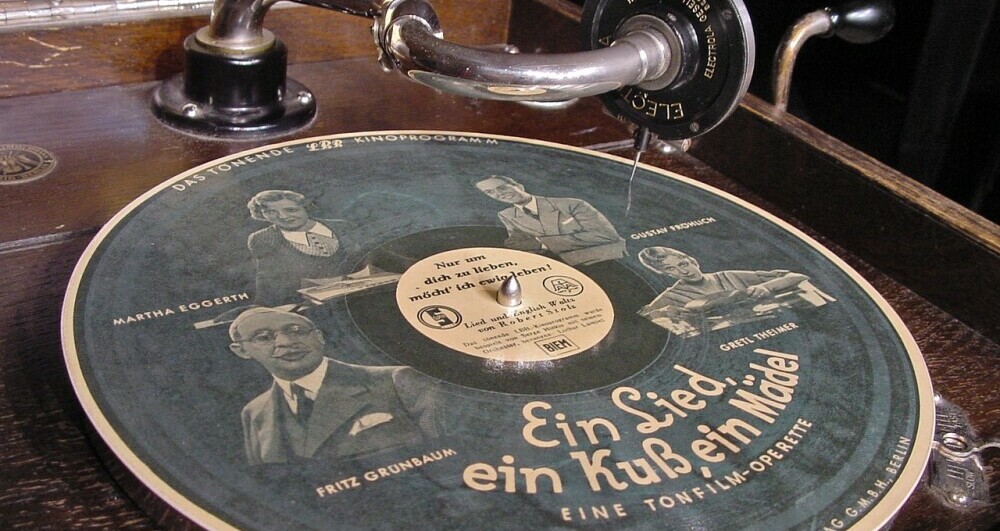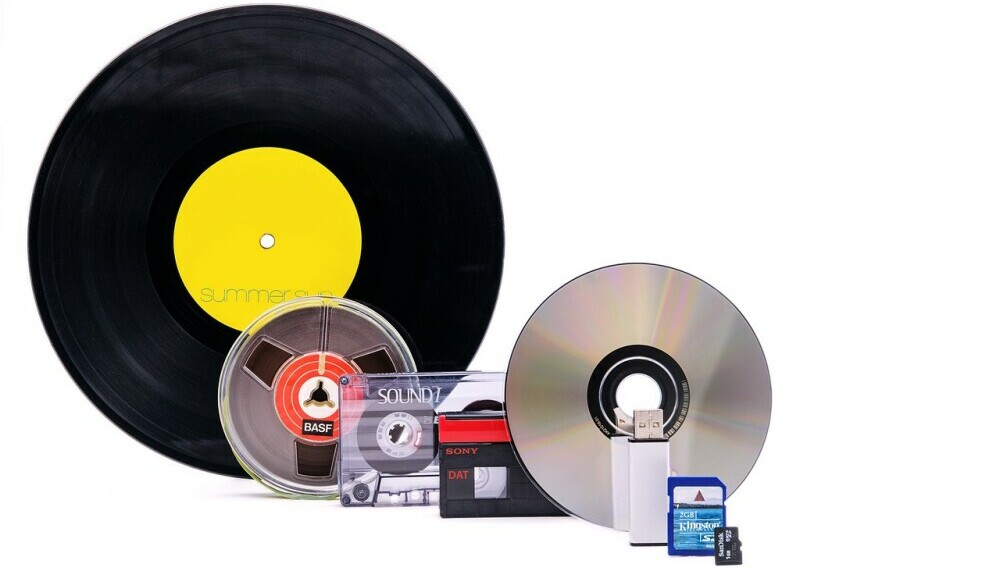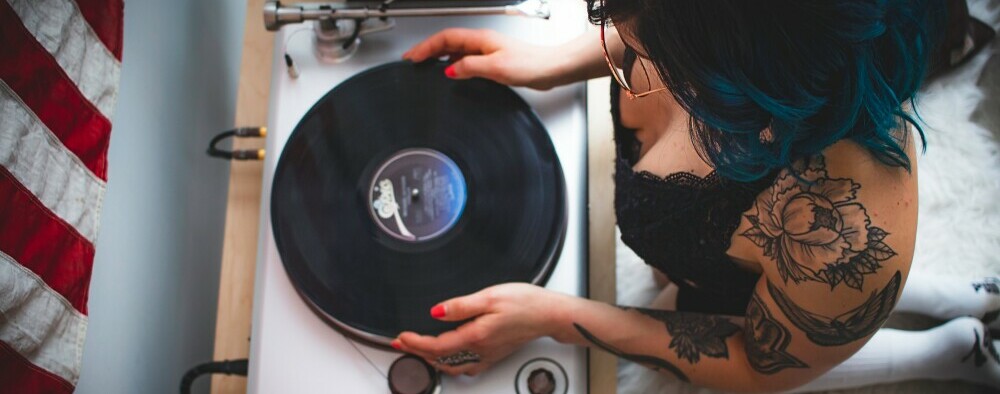Sound is an objective, measurable quantity. But it is also a quality and as such is much more subjective. Accordingly, the question “Do vinyl records sound better?” has as many answers as people to whom you could pose the question.
A brief history of vinyl records
Initially, records weren’t ‘vinyl’ at all. They were made from shellac which is an excretion from the female lac beetle from the trees of India and Thailand. Because shellac was incredibly brittle – it would shatter if dropped – vinyl was developed as an alternative in the years around the Second World War before upstaging shellac in the later 1940s and early 1950s.

Shellac records were of course known as 78s because they rotated at 78 revolutions per minute (rpm). When vinyl came on the scene they were initially 12 inches in diameter and rotated at 33⅓ rpm and then in short order discs of 7 inches in diameter, rotating at 45 rpm were added.
Records weren’t initially thought of as entertainment. The name record comes from what they were designed to do – to record information to assist office workers. A kind of early dictaphone if you will.
Both Thomas Edison and Alexander Graham Bell were involved in the early days of the technology but it was German Emil Berliner who first laid records out flat – both Edison and Bell were exponents of recording cylinders, not discs.
Resurgence in popularity
By the late 1980s, CDs had asserted themselves as the dominant physical medium for music to be consumed in the home. Almost in one fell swoop, vinyl records and compact cassette tapes were seemingly swept aside. The CD seemed to be the ultimate format winner.
But then the internet began to take off and virtual formats correspondingly began to assert their muscle. By the middle of the twenty-tens streaming and downloads accounted for more than half of the total music market and by 2020 this figure was above 80%. However, a thin sliver of sales were still physical, and sales of vinyl records had once again outstripped CD sales.
Just what is people’s fascination with vinyl?
Far more than CDs and far, far more than cassette tapes, vinyl records are an essential feature of the music world. They are utterly without peers in the way they resonate with music lovers both new and old. They are an elemental force in the world, a simple medium for the enjoyment of music. They have literally shaped the landscape of popular music since the end of the Second World War and have left their mark on countless lives.
Records, by their very physicality, evoke a sense of nostalgia. Through them, we recall the days when listening to music involved a ritual – listening was an active, not passive experience. First, you would locate the record you wanted to listen to. Then, you would carefully remove it from its sleeve before dropping it onto the turntable and gently lowering the needle. Halfway through, you would flip it over to play the second side. More involved and more enjoyable than merely clicking a button.
Thus with vinyl, you experience full tactile immersion, but also auditory immersion in
Sound Quality: Vinyl vs Digital Media
If we look at the etymologies of analogue and digital we learn that analogue was originally a Greek word meaning proportionate. In 1946 this was applied to computing to mean a type of signal that has a continuous amplitude.
Digital, on the other hand, originally comes from the Latin digitalis relating to fingers or toes. Of course, we count on our fingers, and there are ten of them, so in late Medieval times, a digit came to mean a numeral less than ten. Eventually, as we moved into the twentieth century it came to be associated with the discrete digits used in computing – 1 and 0 in the binary system.

So, analogue is a continuous sound whilst digital sound is made up of thousands of discrete sound samples which are so tightly packed as to sound continuous.
Some aspects of analogue technology introduce distortions that are perceived as pleasant. These, along with those produced by playback, are often musically enhancing. Audiophiles and nostalgists would insist that these phenomena constitute analogue warmth.
In this sense then, the enjoyment of music isn’t necessarily about precision and accuracy. It’s about mood and character – the lived experience. Maybe the precise, clinical nature of digital music loses the mood and character imbued by those subtle enhancements (imperfections) that make the end result of the output from a vinyl record more vivid and interesting than in real life.
The Manufacturing Process of Vinyl Records
Understanding the record-pressing process
We have seen on this website an in-depth description of the record-pressing process. It suffices to say, that it is a painstaking endeavour which transfers the sound recorded in the recording studio or at the concert hall into grooves on a shiny disc.
Quality control is paramount during the mastering process to ensure that distortions are not introduced into the sound mix. For the same reason, it is of utmost importance in the manufacture of the master disc through to the pressing of the final vinyl product.
How the production process affects the sound
A great issue with the production of vinyl records is the need to restrict the range of frequencies of sound in a record’s groove. Too much bass and the needle will likely jump; ditto if there is too much treble.
Then there is the matter of fact that the groove is quite literally an ever-decreasing circle. Consider this: at the outside edge of a 12-inch LP the needle is travelling at roughly twenty inches per second whilst by the time it gets to the middle it is travelling at a much more sedate eight and a half inches per second.
This translates into less groove length per second of music therefore, sound fidelity is greatly reduced. Consequently, artists and producers have to consider carefully a record’s running order.
Are Vinyl Records Really Worth It?
Cost comparisons between vinyl and CD formats
In the 1980s, when CDs were in their infancy, one of the reasons that they took time to take market share from vinyl was the fact they were roughly twice the price.
Nowadays, even though more people are buying vinyl than CDs, we are seeing the reverse situation, cost-wise for new music.
Vinyl copies of new albums are very much a niche product, ditto for new pressings of legacy albums. On the other hand, collectors can pop along to their local used record stores and find legacy albums pressed from the sixties, seventies, and eighties, unopened, for less than a similar CD purely because of the relative volumes produced.
This rediscovery or new discovery of the thrill of vinyl has resulted in a vinyl renaissance, including people going out and buying new turntables and record players. Somewhat contradictorily, the scope for vinyl to expand is huge, but prices for new vinyl records are unlikely to fall anytime soon. As we can see, nostalgia sells.
Emotional and sentimental values vs quality of sound
That said, it has been argued that the emotional and sentimental appeal of vinyl is perhaps a bigger driver for its renaissance than its sound quality. Issues around the scope of the sound envelope of a vinyl record versus that of a CD are certainly less of a drag on their reemergence than perhaps raw science would demonstrate to us.
Finally, the unique charm of vinyl records

Ultimately, it’s the charm of vinyl that wins for me. As discussed here and in other articles on the site and the internet at large, there are a great number of enthusiasts (new and old) who rejoice in the whole process of playing a record. The tactile, involved, immersive nature of a vinyl session is beaten only by the experience of a gig or a concert to get you closer to the music.
If you have enjoyed this article or have anything you would like to add to the debate, please leave me a comment below.

Your article on the sound quality of vinyl records was fascinating! I’ve always been intrigued by the ongoing debate on whether vinyl truly sounds better. Your explanation of the analog nature and the warmth it adds to the music is compelling. Have you noticed specific genres that tend to sound even better on vinyl? I’ve found that certain classic rock or jazz albums have a depth and richness on vinyl that’s hard to replicate in digital formats.
In my personal experience, listening to vinyl has been more about the ritual and experience rather than just the sound quality. The act of carefully handling the records, setting up the turntable, and enjoying an album from start to finish feels incredibly immersive. How about you? Do you find that the overall experience of listening to vinyl adds to its appeal beyond just the sound quality? Thanks for shedding light on this intriguing aspect of music appreciation!
Hi Pasindu and thank you for your comment.
I have to say that I like Soul and R&B best on vinyl. It is much more evocative of the time when they were in their heyday. All of the clicks, buzzes and hisses really add to make listening to an R&B record sound and feel like listening to it in a small club, with people closely packed together and the band within touching distance.
Yes, the who process from start to finish of getting your record from the rack, carefully removing it from the sleeve, setting it on the turntable and gently easing the needle onto it just feels so right.
Thanks,
Simon 😉